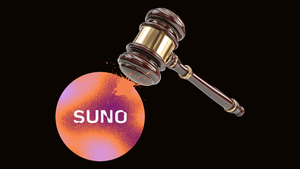Not only is Suno wrong to claim that AI training is fair use under American copyright law, it’s also misreading US copyright rules when it comes to stream-ripping. That’s according to the latest filing from the major record companies in their ongoing legal battle with the gen-AI business, which is currently tipped to be raising $100 million in new investment with a rumoured $2 billion valuation.
When it comes to the stream-ripping claims, a new strand of their legal battle with Suno, the majors say the key question is whether the music companies have “plausibly alleged” that technical protection measures put in place by YouTube to stop people grabbing permanent copies of temporary streams “control access” to the labels’ music, as defined in the US Digital Millennium Copyright Act. The new filing insists “they have” and Suno’s arguments to the contrary are simply “incorrect”.
The majors are trying to get their Suno lawsuit amended to include claims that the AI company put together its training dataset of sound recordings by illegally stream-ripping audio from YouTube. They hope that adding a piracy claim to their lawsuit will strengthen their case, based on a recent judgement in another AI copyright legal battle involving a group of book authors and Anthropic.
As far as the music industry is concerned, Suno is liable for copyright infringement because it copied millions of tracks onto its servers without permission in order to train its generative AI model. But Suno, like many AI companies, claims using existing copyright protected works in that way is ‘fair use’ under US law, meaning it didn’t need permission to make those copies.
The music industry disagrees, but in the book authors v Anthropic case the judge ruled that AI training was fair use, providing an AI company sources its training materials from legitimate sources. Which is why it’s now important for the majors to show that Suno relied on piracy to gather its training dataset.
Which means an already complicated copyright case has got even more complicated. Not only are we having to deal with the complex and slightly tedious rules for assessing whether or not Suno’s use of music is fair use, we’re also concerned with the complex and slightly tedious rules relating to stream-ripping.
The music industry has long argued that stream-ripping services violate rules in US copyright law that prohibit the circumvention of technical protection measures - or TPMs - like those employed by YouTube to stop people ripping content off its platform. That was the conclusion in the big legal dispute between the majors and stream-ripper Yout.
However, Suno now argues that when it comes to entities doing the stream-ripping - rather than those providing stream-ripping services to third parties - the prohibition only applies to TPMs that control ‘access’ to content, not those that control the ‘copying’ of content.
And YouTube’s TPMs control copying not access. Therefore, Suno says, the major’s new stream-ripping claims should be rejected by the courts, because its ripping of audio from YouTube didn’t break the law.
But, claim the majors in their new legal filing, that’s simply not true. While YouTube TPMs may control copying they also control access. And nothing in US copyright law “bars a TPM from controlling both access and copying” at the same time.
Which means the rules in the DMCA prohibiting the circumvention of TPMs apply to YouTube’s TPMs, which means Suno violated the law. And while it’s true Suno specifically needed to copy audio from YouTube, rather than access it, the intent of the entity circumventing the TPMs is irrelevant.
The majors’ attempt to demonstrate that Suno sourced its music through piracy has brought renewed importance to the Yout stream-ripping case, which is still being appealed by the stream-ripper. That legal battle is now relevant not just in relation to the music industry’s ongoing battle with piracy, but also in the context of its copyright disputes with generative AI companies.
So much so, Suno recently asked the courts to allow it to intervene in the Yout appeal in an attempt to ensure the judgement there doesn’t negatively impact on its own legal battles with the music industry

